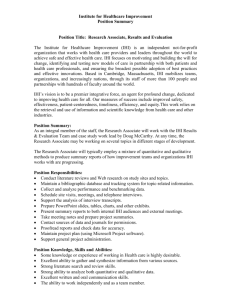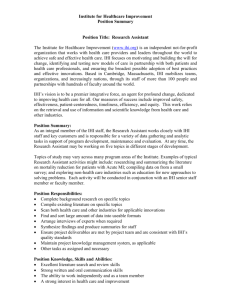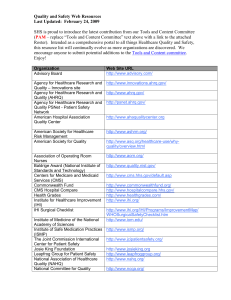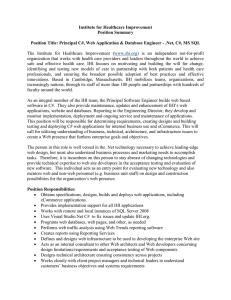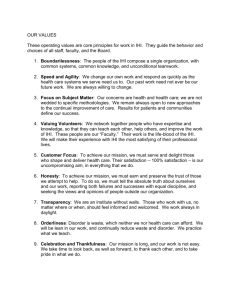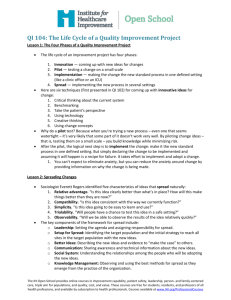University of Florida College of Public Health & Health Professions Syllabus
advertisement
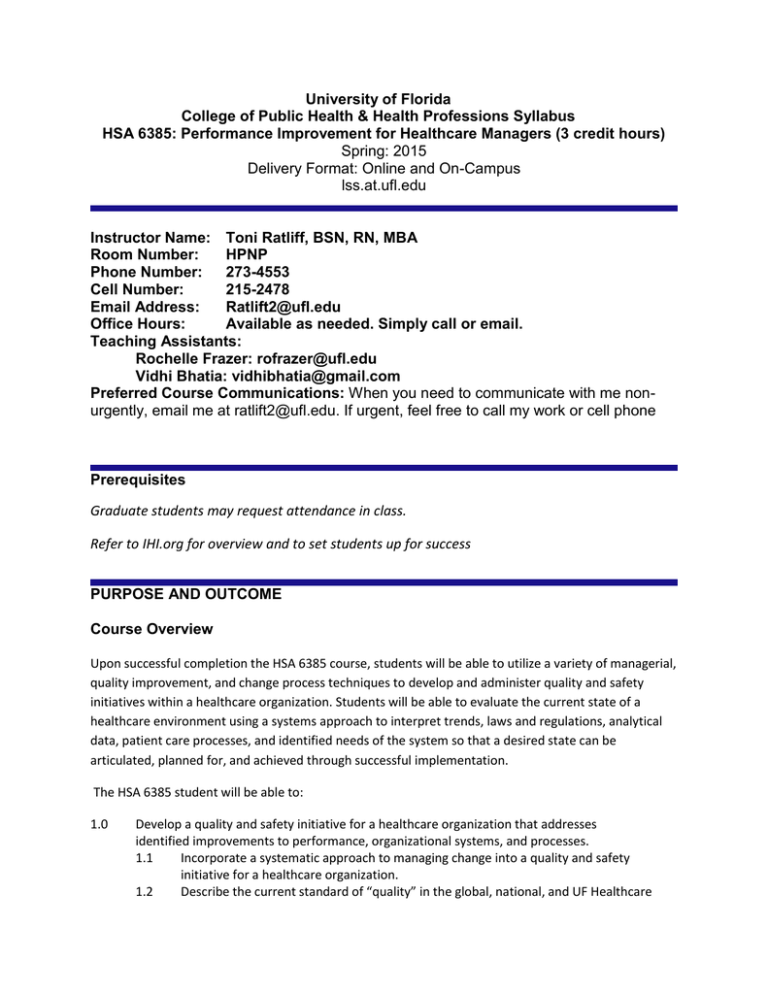
University of Florida College of Public Health & Health Professions Syllabus HSA 6385: Performance Improvement for Healthcare Managers (3 credit hours) Spring: 2015 Delivery Format: Online and On-Campus lss.at.ufl.edu Instructor Name: Toni Ratliff, BSN, RN, MBA Room Number: HPNP Phone Number: 273-4553 Cell Number: 215-2478 Email Address: Ratlift2@ufl.edu Office Hours: Available as needed. Simply call or email. Teaching Assistants: Rochelle Frazer: rofrazer@ufl.edu Vidhi Bhatia: vidhibhatia@gmail.com Preferred Course Communications: When you need to communicate with me nonurgently, email me at ratlift2@ufl.edu. If urgent, feel free to call my work or cell phone Prerequisites Graduate students may request attendance in class. Refer to IHI.org for overview and to set students up for success PURPOSE AND OUTCOME Course Overview Upon successful completion the HSA 6385 course, students will be able to utilize a variety of managerial, quality improvement, and change process techniques to develop and administer quality and safety initiatives within a healthcare organization. Students will be able to evaluate the current state of a healthcare environment using a systems approach to interpret trends, laws and regulations, analytical data, patient care processes, and identified needs of the system so that a desired state can be articulated, planned for, and achieved through successful implementation. The HSA 6385 student will be able to: 1.0 Develop a quality and safety initiative for a healthcare organization that addresses identified improvements to performance, organizational systems, and processes. 1.1 Incorporate a systematic approach to managing change into a quality and safety initiative for a healthcare organization. 1.2 Describe the current standard of “quality” in the global, national, and UF Healthcare 1.3 2.0 Integrate the principles and tools of human resources management, organizational behavior, and the leadership of change to achieve the goals of a healthcare organization. 2.1 2.2 2.3 2.4 2.5 3.0 environments. Utilize presentation tools and techniques to examine and chart processes and systems. Administer quality improvement principles to improve patient care processes. Propose specific change process techniques that address the identified barriers of a healthcare organization. Describe the various techniques used by organizations to overcome barriers to change. Determine when it is necessary to force a function upon an organization to reduce errors. Describe the role that leadership plays in achieving quality in a healthcare setting. Appraise a healthcare setting to locate deficiencies, waste, barriers to improvement, and unidentified needs. 3.1 3.2 3.3 3.4 3.5 3.6 3.7 3.8 3.9 3.10 3.11 Utilize analytical tools to measure organizational performance. Utilize evidenced-based techniques to analyze patient care processes. Identify key stakeholders within a healthcare organization. Detect barriers to change within a healthcare organization. Characterize the culture of a healthcare organization so that the impact of the culture upon improvement is fully articulated. Locate the sources that collectively define “quality” in a healthcare environment. Explain the methodology typically used to assess Process Measures, Outcome Measures, and Balancing Measures. Utilize appropriate tools to assess variation, reliability, random, and specific-cause variation. Identify processes that lead to wasted resources within a healthcare setting. Describe the six AIMS for improvement identified by IOM and their impact upon a healthcare setting. Determine whether a system weakness or problem is QA, QI, PI oriented. Learning Objective 1.0 1.1 1.2 1.3 2.0 Learning Activity Assigned IHI Assigned Reading Critically Ill PDSA Template Assigned IHI Assigned IHI Brainstorming/Analysis ToolsFishbone, Flow Chart, Control Chart Assigned IHI Rank Order of Reduction Assessment Final Project Final Project HCAHPS Checklist Individual Presentation Final Project Final Project 3.5 3.6 Assigned IHI Reading: The Art of Powerful Questions Assigned IHI Analysis Tools- Fishbone, Flow Chart, Control Chart Case Study SHCC & Outside Videos Case Study Assigned IHI Rank Order of Reduction Assigned IHI Assigned IHI Improvement Effective Team Leaders Reading: Leadership that gets Results Assigned IHI Care Process Improvement PDCA Brainstorming/Analysis Tools→ Fishbone, Flow Chart, Control Chart Rank Order of Reduction Assigned IHI Template PDSA Assigned IHI Inspired to care Assigned IHI Assigned IHI 3.7 Assigned IHI 3.8 Assigned IHI Analysis tools- Fishbone, Flow Chart, Control Chart Assigned IHI IOM 6 Aims Reading Assignment Assigned IHI Case Study 2.1 2.2 2.3 2.4 2.5 3.0 3.1 3.2 3.3 3.4 3.9 3.10 3.11 Inspire to Care Assignment Final Project Final Project Video Assessment Final Project Final Project Participation Requirement HCAHPS Checklist Final Project Final Project Final Project Final Project Final Project Final Project HCAHPS Checklist Final Project HCAHPS Checklist Final Project Final Project Final Project Participation Requirement Final Project Final Project Relation to Program Competencies Course Objective Program Competencies Assignment and Activities Develop a quality and safety initiative for a healthcare organization that addresses identified improvements to performance, organizational systems, and processes. Interpret, monitor and comply with laws and regulations that protect health practitioners, organizations and the public (HEC-2) IHI Activities, Individual Presentations (In Class Lectures), HCAHPS Checklist, Class Participation, Project Progress at Midterm, Final Project Integrate the principles and tools of human resources management, organizational behavior, and the leadership of change to achieve the goals of a healthcare organization. Incorporate principles and tools of human resource management, organizational behavior and change management to achieve organizational goals. (HOP-4) Class Participation, Project Progress at Midterm, Final Project Upon completion of the course students should be able to: Articulate how leaders energize stakeholders with a compelling vision that fosters and sustains shared commitment to organizational goals. (LP-5) Appraise a healthcare setting to locate deficiencies, waste, barriers to improvement, and unidentified needs. Design and conduct quantitative analyses and other forms of analyses to measure and improve organizational performance. (BAT-0) Perform environmental scans and needs assessment in support of program and organizational development. (HEC-1) Individual homework assignments, HCAHPS Checklist, Project Progress at Midterm, Final Project DESCRIPTION OF COURSE CONTENT Topical Outline/Course Schedule COURSE GOAL Week 1 Jan 12 Syllabus and Introduction- Explain the big picture of class and tips for success. Guided Discussion- Brainstorm QI activities experienced in work and/or internships Assignment: Sign into IHI.org and register in Open Classroom Quality Improvement courses Sakai pre-test and Student Analysis Watch Welcome from the Instructor and Course Navigation videos Week 2 Jan 26 Readings: None Individuals present on assigned readings Guided Discussion/Case Study- Describe who was involved in caring for Mary and involved in poor health outcome Construct a fishbone diagram Readings: IHI.org Quality Improvement course: Q1, 101: Lesson 1 and 2 Critically Ill: Chapter 1 Week 3 Feb 2 Individuals present on assigned readings Guided Discussion/Case Study- Definition of quality. What is waste, variation, the 6 AIMS? Construct a flowchart to assess steps in Pneumonia treatment in ED. Assignment: HCAHPS Checklist Readings: IHI.org Quality Improvement course: Q1 101: Lesson 3 Critically Ill: Chapter 2 Week 4 Feb 9 Individuals present on assigned readings. Group Work- Discuss individual exercise and combine to complete one Handwashing Fishbone and one Handwashing flowchart. Assignment: Fishbone- Handwashing Readings: Critically Ill: Chapter 3. Review ISMP Reducing Errors Week 5 Feb 16 Individuals present on assigned readings. Guest speaker- Dr. Southwick Assignment: Questions/exercises from Dr. Southwick Video Assessment, SHCC Week 6 Feb 23 Readings: IHI.org Quality Improvement course: Q1 101, lesson 4, Q1 102, lesson 1, 2. Critically Ill: Chapter 4 Individuals present on assigned readings. Guided Discussion/Group Work- Review/Construct control chart Readings: IHI.org Quality Improvement course: Q1 102, lesson 3 Critically Ill: Chapter 5 Leadership That Gets Results Week 7 Mar 9 Individuals present on assigned readings. Group work- Review Handwashing Template. From previous tools (Fishbone and Flowchart) plug in Background, AIM, Possible improvements, pick one Improvement, Develop Plan, and Measures (decide if/how to use Control chart or other tool to measure). Readings: IHI.org. Quality Improvement course: Q1 105, lesson 1, 3. Critically Ill: Chapter 6 Week 8 Mar 23 Class turns in Handwashing project Readings: IHI.org. Quality Improvement course: Q1, 105: Lesson 2 Critically Ill: Chapter 7 Week 9 Mar 30 Guest Speaker- Dr. Southwick Assignment: Questions/exercises from Dr. Southwick Readings: The Art of Powerful Question Care Process Improvement Health Care Leader Action Guide to Effectively Use HCAHPS Week 10 Apr 6 Week 11 Apr 13 Group Work- Apply lessons from previous classes Work on Final Project/Inspired to care video/media Final Group Presentations Group Work- Apply lessons from previous classes Work on Final Project/Inspired to care video/media Week 12 Apr 20 Final Group Presentations Assignment: Complete Post Test Disclaimer: This syllabus represents my current plans and objectives. As we go through the semester, those plans may need to change to enhance the class learning opportunity. Such changes, communicated clearly, are not unusual and should be expected. Course Materials and Technology For issues with technical difficulties for E-learning please contact the UF Help Desk at: ● Learning-support@ufl.edu ● (352) 392-HELP - select option 2 ● https://lss.at.ufl.edu/help.shtml ACADEMIC REQUIREMENTS AND GRADING Grading Assignment Points or percentage Final Group project and Group test 40% Project Progress at Midterm 15% Individual presentations 20% Individual homework submissions 10% HCAHPS Checklist 10% Class and group participation 5% Points earned Letter Grade 93-100 90-92 87-89 83-86 80-82 77-79 73-76 70-72 67-69 63-66 60-62 Below 60 A A- B+ B B- C+ C C- D+ D D- E Please be aware that a C- is not an acceptable grade for graduate students. A grade of C counts toward a graduate degree only if an equal number of credits in courses numbered 5000 or higher have been earned with an A. Letter Grade Grade Points A A- B+ B B- C+ C C- D+ D D- E WF I NG S-U 4.0 3.67 3.33 3.0 2.67 2.33 2.0 1.67 1.33 1.0 0.67 0.0 0.0 0.0 0.0 0.0 For greater detail on the meaning of letter grades and university policies related to them, see the Registrar’s Grade Policy regulations at: http://catalog.ufl.edu/ugrad/current/regulations/info/grades.aspx Exam Policy I will answer questions regarding assignments, quizzes, exams and self-assessments prior to submission, once submitted and grade given. Policy Related to Make up Exams or Other Work The only time a student will be permitted to make up assignments is with an appropriate reason, a note from a physician, and advance permission from professor if not ill. Policy Related to Required Class Attendance Part of your class grade is based on class participation in which poor attendance, not showing up for class or not signing into Sakai or IHI and completing the assigned work are part of class participation. If an assignment is turned in late, a letter grade will be decreased by one letter for every day late. STUDENT EXPECTATIONS, ROLES, AND OPPORTUNITIES FOR INPUT Expectations Regarding Course Behavior/ Communication Guidelines All members of the class are expected to follow rules of common courtesy in all email messages, threaded discussions and chats. [Describe what is expected and what will occur as a result of improper behavior] http://teach.ufl.edu/docs/NetiquetteGuideforOnlineCourses.pdf Academic Integrity Students are expected to act in accordance with the University of Florida policy on academic integrity. As a student at the University of Florida, you have committed yourself to uphold the Honor Code, which includes the following pledge: “We, the members of the University of Florida community, pledge to hold ourselves and our peers to the highest standards of honesty and integrity.“ You are expected to exhibit behavior consistent with this commitment to the UF academic community, and on all work submitted for credit at the University of Florida, the following pledge is either required or implied: “On my honor, I have neither given nor received unauthorized aid in doing this assignment.” It is your individual responsibility to know and comply with all university policies and procedures regarding academic integrity and the Student Honor Code. Violations of the Honor Code at the University of Florida will not be tolerated. Violations will be reported to the Dean of Students Office for consideration of disciplinary action. For additional information regarding Academic Integrity, please see Student Conduct and Honor Code or the Graduate Student Website for additional details: https://www.dso.ufl.edu/sccr/process/student-conduct-honor-code/ http://gradschool.ufl.edu/students/introduction.html Please remember cheating, lying, misrepresentation, or plagiarism in any form is unacceptable and inexcusable behavior. Online Faculty Course Evaluation Process optional in UF Template Students are expected to provide feedback on the quality of instruction in this course by completing online evaluations at https://evaluations.ufl.edu so make sure you include a statement regarding the value and expectation for student participation in course evaluations. We suggest you include a comment regarding how you will use the evaluations (e.g. to make specific improvements to the course and teaching style, assignments, etc.). It is also important to make some statement regarding the direct influence they have on faculty tenure and promotion, so your input is valuable. Evaluations are typically open during the last two or three weeks of the semester, but students will be given specific times when they are open. Summary results of these assessments are available to students at https://evaluations.ufl.edu/results/ SUPPORT SERVICES Accommodations for Students with Disabilities If you require classroom accommodation because of a disability, you must register with the Dean of Students Office http://www.dso.ufl.edu within the first week of class. The Dean of Students Office will provide documentation to you, which you then give to the instructor when requesting accommodation. The College is committed to providing reasonable accommodations to assist students in their coursework. Counseling and Student Health optional in UF Template Students sometimes experience stress from academic expectations and/or personal and interpersonal issues that may interfere with their academic performance. If you find yourself facing issues that have the potential to or are already negatively affecting your coursework, you are encouraged to talk with an instructor and/or seek help through University resources available to you. The Counseling and Wellness Center 352-392-1575 offers a variety of support services such as psychological assessment and intervention and assistance for math and test anxiety. Visit their web site for more information: http://www.counseling.ufl.edu. On line and in person assistance is available. You Matter We Care website: http://www.umatter.ufl.edu/. If you are feeling overwhelmed or stressed, you can reach out for help through the You Matter We Care website, which is staffed by Dean of Students and Counseling Center personnel. The Student Health Care Center at Shands is a satellite clinic of the main Student Health Care Center located on Fletcher Drive on campus. Student Health at Shands offers a variety of clinical services. The clinic is located on the second floor of the Dental Tower in the Health Science Center. For more information, contact the clinic at 392-0627 or check out the web site at: https://shcc.ufl.edu/ Crisis intervention is always available 24/7 from: Alachua County Crisis Center: (352) 264-6789 http://www.alachuacounty.us/DEPTS/CSS/CRISISCENTER/Pages/CrisisCenter.aspx BUT – Do not wait until you reach a crisis to come in and talk with us. We have helped many students through stressful situations impacting their academic performance. You are not alone so do not be afraid to ask for assistance.
